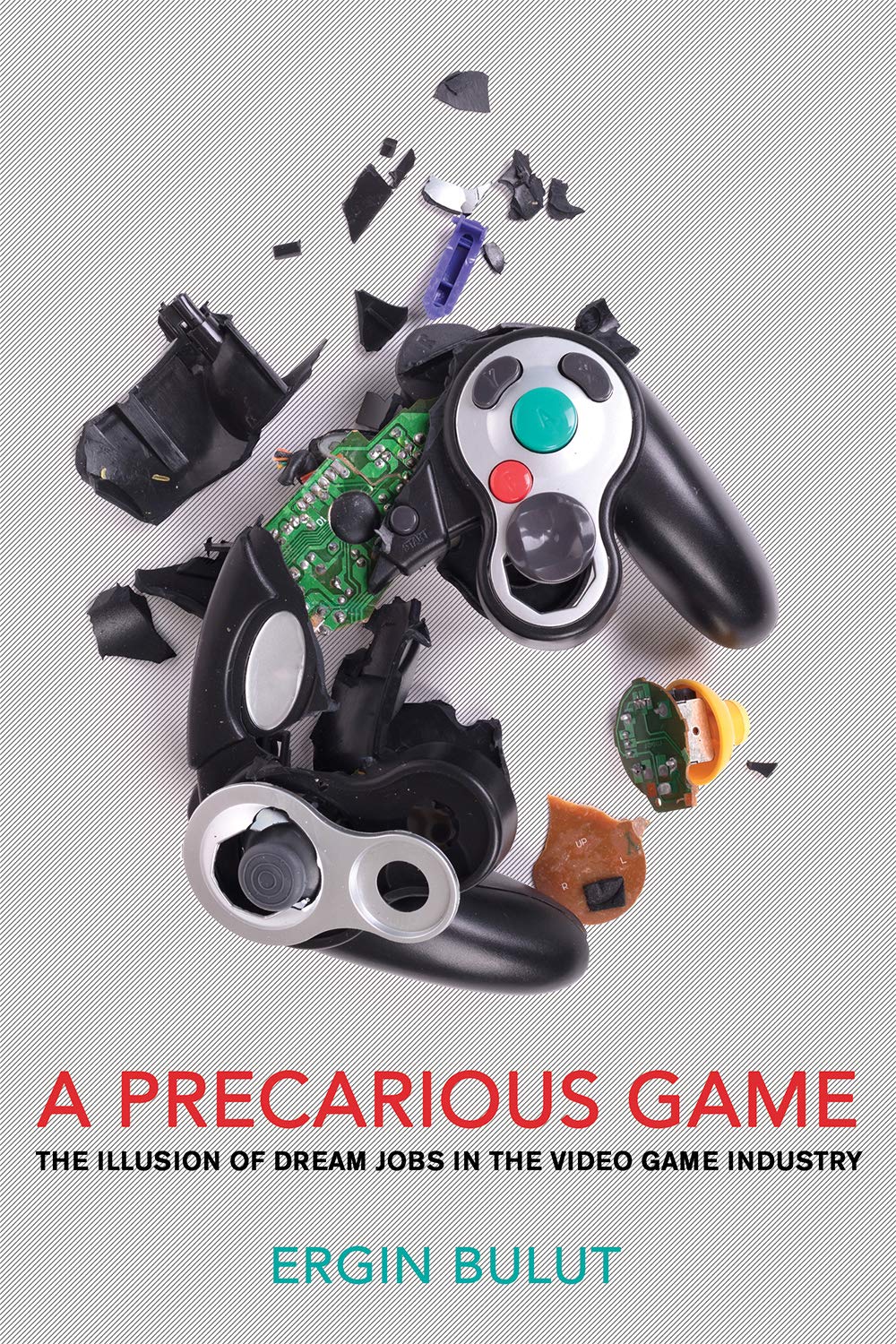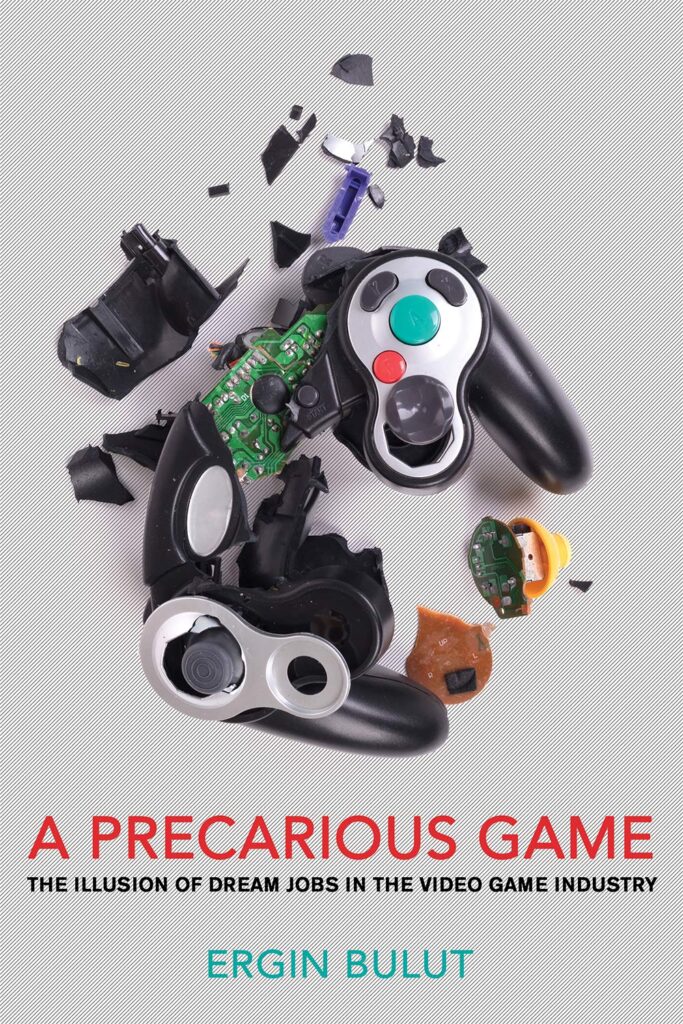
Jamie Woodcock Reviews Ergin Bulut, A Precarious Game: The Illusion of Dream Jobs in the Videogame Industry, London, ILR Press, 2020.
Videogame production has been back in the news with stories of the working conditions at CD Projekt Red and the upcoming – delayed again – Cyberpunk 2077. While there have been campaigns around “crunch”, or overwork, in the industry going back to the 2003 “ea_spouse” open letter.
Beyond these headlines, comparatively less is known outside of the industry about the working conditions of videogames studios. This is particularly the case within academic research on work or wider Marxist analysis. However, since 2018, there has been a growing critical voice from workers within the industry, increasingly covered by some of the now-unionised videogame press. Workers have joined or formed unions in France, South Korea, the USA, Canada, Ireland, and the UK, amongst others. Within this fast-moving context (which will hopefully have more developments by the time this review is published) there is a growing interest in what happens in the ‘hidden abode’ (as Marx referred to
A Precarious Game by Ergin Bulut’s is an important contribution to the growing field of critical and Marxist influenced scholarship on videogame work. At its core, the book is a detailed and engaged ethnographic account of a videogame studio, pseudonymously referred to as ‘Desire’, and the dynamics that developed there over time. Bulut focuses on four process: ‘rationalization upon acquisition, spatialization, financialization, and precarization. Among these, precarization anchors the whole story’ (p. 4). This means much of the book unpicks the ‘immaterial labor’ involved in the production of AAA (large, mainstream) videogames. However, it does not fall into the trap of focusing solely on the white-collar employment in the studio, drawing back at points to consider the other kinds of work involved, both along the supply chain and in other aspects of production like videogame testing.
The book builds upon a growing literature of critical game studies, including, as Bulut notes, Dyer-Witheford and de Peuter’s excellent Games of Empire (which has recently been revisited in a special issue of the journalGames and Culture on the tenth anniversary of its publication)
The book builds on some of the weaknesses of more mainstream scholarship on work, which often has less interest in detailed workplace investigations. Workplace ethnography is, unfortunately, becoming increasingly more difficult to pass through ethics review boards. It is even rarer within studies of the videogames industry.
The book is full of examples of how this is worked out in practice, from the informality of the workplace and Nerf gun fights, to the huge additional pressures this informality introduces, both during work hours and the reproduction of labour power outside of it. Here, precarity is not understood only as ‘the top-down imposition of insecurity’ as it can so often be understood. It is worth quoting Bulut at length:
Rather, the government of subjects – in our case, video game developers – actively depends on workers’ participation from below, which is enabled by their creative autonomy, passion for work, the ethos of hard work, and game development’s cool status; these aspects not only empower the workers in their everyday practices but also deepen precarization. Simply put, precarity is productive of subjectivities especially because it is entrenched in love. It doesn’t exist just because there are fewer jobs. On the contrary, precarity is strong especially due to the game developers’ ideological tendency towards abstract promises of play and the materiality of glamorous employment (p. 6)
This chimes with my own research with game workers, drawing out the complex experience of working practices that can be both precarious but also desired, exploited and enjoyed.
The importance of this kind of detailed ethnographic research is that it can shed new light on the processes of worker organisation that are beginning to unfold in the industry. As Bulut notes, ‘game workers’ organizing attempts suggest that contemporary capital’s strategy to enlist subjectivity for work is likely to face resistance’ (p. 7). While the new focus on organising in the industry is exciting, it is important to remember that below the surface of work there is always resistance, which as Braverman explains, is like ‘a subterranean stream that makes its way to the surface when employment conditions permit, or when the capitalist drive for a greater intensity of labor oversteps the bounds of physical and mental capacity.’
In the short conclusion, Bulut outlines how for game workers, ‘doing what one loves can be a mixed blessing; joyful as it is, love can be precarious and alienating … a critique of love, then is in order’ (p. 160). This involves a critique of the specific kinds of work that is carried out, taking into account the role of gender, race, disability, sexuality, as well as why some kinds of work are said to matter or not, stay hidden, or become visible. While Desire was not the site of open worker organising – with some participants even voicing opposition to the idea – Bulut does not fall into the trap of writing off worker power in the industry. Reading this chapter reminded me of an encounter I had with a game studies professor who critiqued my writing on game worker struggle,
In summary, this book is an excellent contribution to the growing critical scholarship on videogame work. It takes seriously the experience of workers in the sector, combines ethnographic detail with a political economy of the industry, and uncovers dynamics that play out in these workplaces. While this close focus is needed for understanding videogame workers, the videogames they make, and their role in contemporary capitalism, the book maintains a critical vision beyond the workplace itself. As Bulut argues ‘it’s ironic that, although video games are mostly marketed as digital venues where players’ dreams and utopias are realized through interactive technology, the industry becomes suddenly serious when workers start daydreaming’ (p. 173). This is part of the challenge of both researching and organising in new sectors of work: connecting the big questions of power and transformation to the smaller specificities and peculiarities of the workplace.
References
Badger, A. and Woodcock, J. (2019) ‘Ethnographic Methods with Limited Access: Assessing Quality of Work in Hard to Reach Jobs’, in D. Wheatley (ed) Handbook of research methods on the quality of working lives, 135-146. Cheltenham: Edward Elgar.
Braverman, H. 1999. Labor and Monopoly Capital: The Degradation of Work in the Twentieth Century. London: Monthly Review Press.
Dyer-Witheford, N. and de Peuter, G. 2009. Games of Empire: Global Capitalism and Videogames, Minneapolis, MN: University of Minnesota Press.
Hardt, M. and Negri, A. 2000. Empire. Cambridge: Harvard University Press.
Jaffe, S. Forthcoming, 2021. Work Won’t Love You Back: How Devotion to Our Jobs Keeps Us Exploited, Exhausted, and Alone.
Kerr, A. 2017. Global Games: Production, Circulation and Policy in the Networked Era. New York: Routledge.
Kücklich, J. 2005. ‘Precarious playbour: Modders and the digital games industry’, Fibreculture Journal, 5:1
Marx, K. 1867 [1977]. Capital: A Critique of Political Economy. Volume 1. London: Penguin Books.
Meija, R. 2012. “Playing the Crisis: Video Games and the Mobilization of Anxiety and Desire.” PhD Dissertation, University of Illinois, Urbana-Champaign.
Nakamura, L. 2009. ‘Don’t Hate the Player, Hate the Game: The Racialization of Labor in World of Warcraft’, Critical Studies in Media Communication, 26(2): 128-44.
Ruffino, P. and Woodcock, J. 2020. ‘Game Workers and the Empire: Unionisation in the UK Video Game Industry’, Games and Culture: a journal of interactive media.
Terranova, T. 2000. ‘Free Labor: Producing Culture for the Digital Economy’, Social Text, 63 (18, 2): 33-58.
Thompson, P., Parker, R., and Cox, S. 2015. ‘Interrogating Creative Theory and Creative Work: Inside the Games Studio’, Sociology, 50(2): 316-332.
Woodcock, J. 2016. ‘The work of play: Marx and the video games industry in the United Kingdom’, Journal of Gaming and Virtual Worlds, 8(2): 131-143.
Woodcock, J. 2019. Marx at the Arcade: Consoles, Controllers, and Class Struggle, Chicago: Haymarket Books.
Woodcock, J. 2020. ‘For Video Game Companies, “Crunch” Working Conditions Are Increasingly the Norm’, Jacobin: https://jacobinmag.com/2020/11/video-games-cyberpunk-2077-crunch-overwork/

